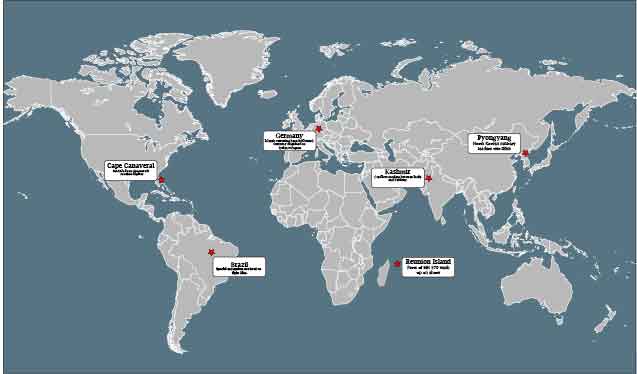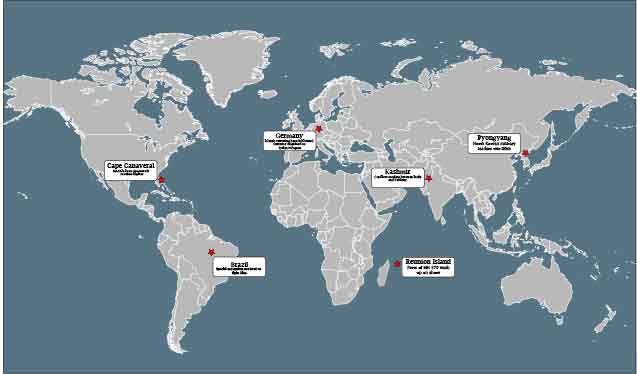
While we focused on the election, the world transformed
Carson Myers, staff writer
While Americans were focused on the 2016 election, the rest of the world was busy living their lives.
Graphic by Carson Myers
After the 2016 presidential election that took place on November 8, the American populace has struggled to return to their apolitical lifestyles.
Tension began to rise when Donald Trump announced his candidacy for presidency in May of 2015. For 18 months, the race for White House eclipsed geopolitical tectonic shifts occurring around the world. As the media faithfully reported Trump’s and Clinton’s every belch, other events that would have been major news stories were relegated to the dust bin of history. When the election results were announced on November 9, Americans found themselves asking a difficult question: now what?
Aristotle theorized the concept of horror vacui: nature abhors a vacuum. While this concept usually applies to physics, it is also taking place in the American psyche. Now that the election is over, there has been a sharp decrease in emotionally-charged news content among cable news providers. American media consumers are now starving for the sleazy, National Enquirer-esque news coverage to which they have become accustomed.
After the emotional climax of election night, political junkies have nothing to replace the dog-and-pony show that was the 2016 election. Obviously, not every American holds a worldview that is limited to the scope of cable news. However, monumental events have occurred while America was focused on e-mails and comments made on a bus.
Pamela J. Shoemaker is a professor of communication at Syracuse University. She has co-authored a book with Tim Vos entitled “Gatekeeping Theory” and won the Paul J. Deutschmann award for her research of media gatekeepers. Shoemaker theorizes that most Americans are so dependent on the media that any news not covered will be unknown to them.
“The most important aspect of gatekeeping is that issues and events that are not covered are absent from the worldviews of most audience members,” wrote Shoemaker. “The mass media provide a conduit through which new ideas and the groups who introduce them can reach the larger public.”
According to Shoemaker, the cable news networks do not package news stories with the sole purpose of educating the public. Instead, news lineups are contrived, controlled and meticulously planned. To some, the media’s decision to leave out events is nothing short of bias. After all, omitting facts from an otherwise truthful statement can be considered libel in civil court cases. Americans are becoming increasingly wary of cherry-picking reporters who have the ability to sway public opinion.
In a Nov. 18, 2016 poll, the Pew Research Center concluded that 59 percent of U.S. adults want facts reported without interpretation. The increasing number of conservative-oriented Americans are keeping a close watch on mainstream media which tends to be more liberal.
Many believe that media members are engaging in selective reporting to comply with the ideology of party bosses. While a growing number of gatekeeper theorists would agree, others argue that the reason for selective coverage of events is less insidious.
Can media selection be boiled down to straightforward economics? After all, traditional news mediums have to earn money to stay competitive. The 21st century is an age where a photojournalist making $40,000 has to compete with anyone with an iPhone who just happens to see a major event unfolding and live-streams it on Facebook.
Erin Neal realizes what dire straits the cable networks would be in if they didn’t have a relatively monopolistic control of television election coverage. Neal, a professor of communication at North Greenville University has worked with Clemson University’s news agencies. To Neal, selective coverage is routine.
“I was an undergraduate student at Clemson when Malaysia Airlines flight 370 went missing,” said Neal. “[The news team] spent weeks covering the story when there was really no evidence. It was all analysis. Now, evidence of MH370 is piling up and the story no longer piques the interest of mainstream media.”
Due to the current mindset of consumers, learning about pieces of an airplane being found that went missing two years ago is less dramatic than the election process, and subsequently less lucrative. In the hyper-competitive news marketplace, stories must be able to generate revenue. Although strictly hypothetical, media outlets have become experts at gambling on what will be best for them. As a result, it is now up to the consumer to learn about news outside the narrow lenses of American news television.

